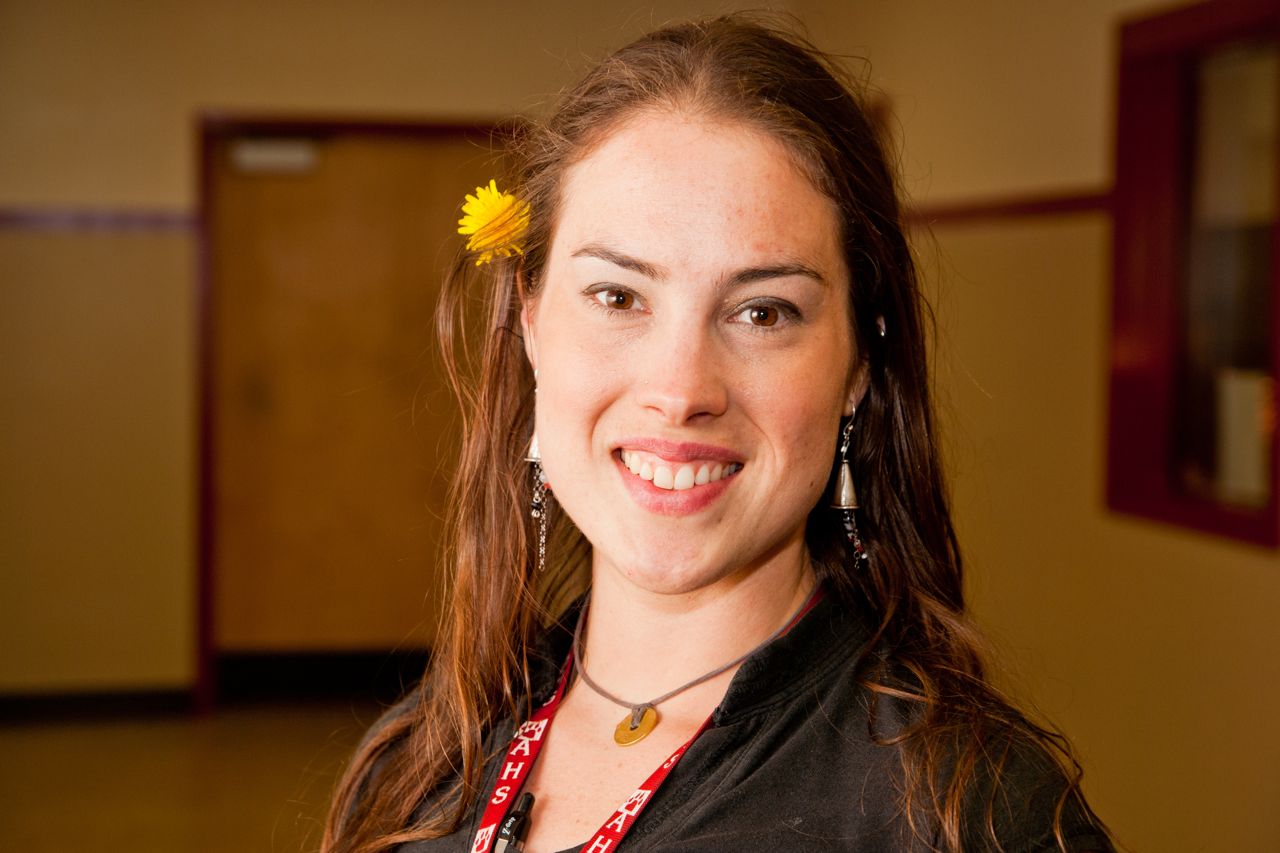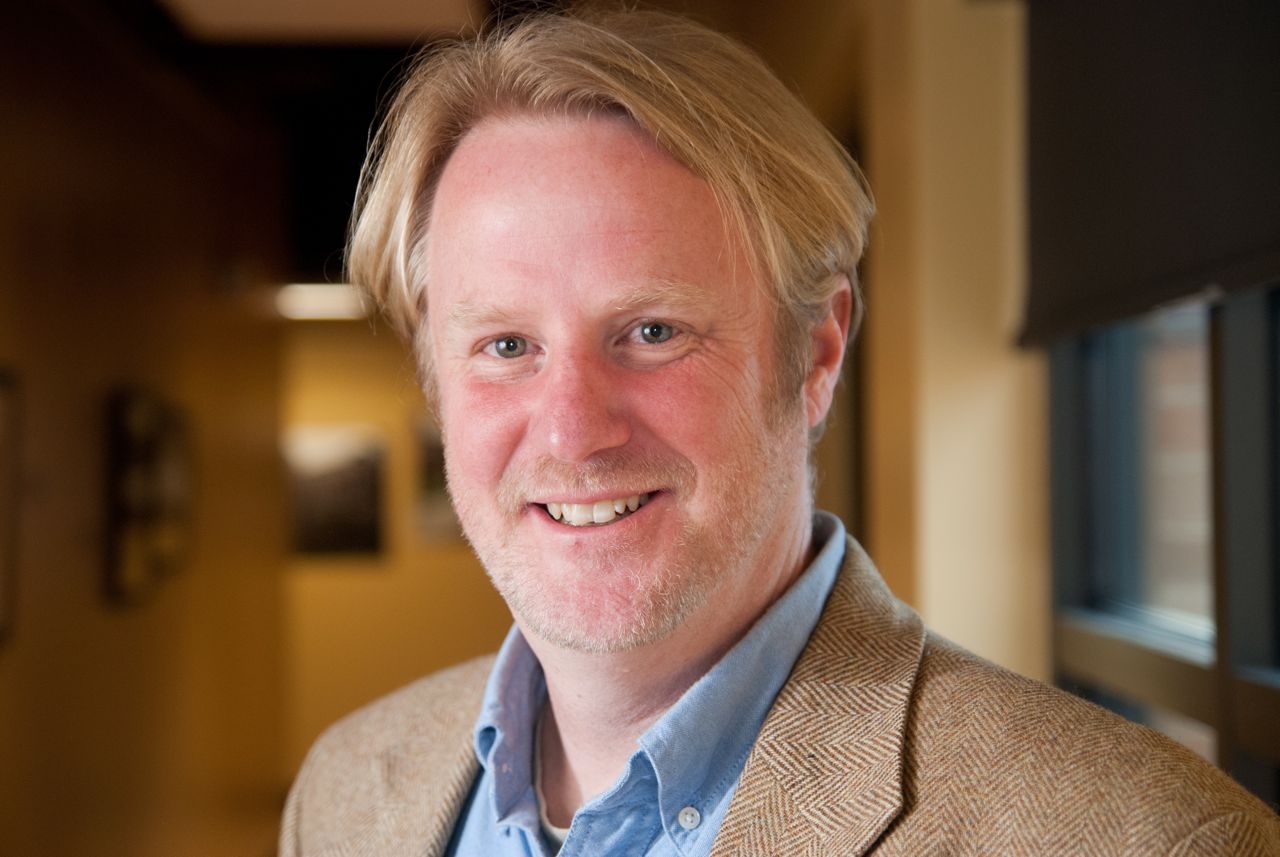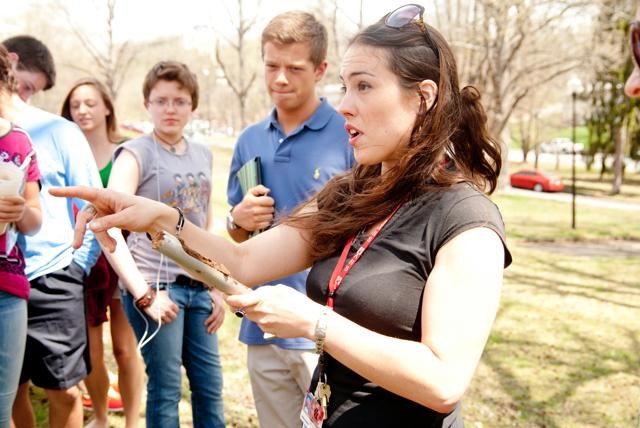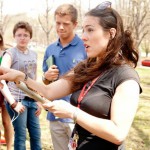- Forces for change: Professor Keith McDade (left) and Asheville High School environmental science teacher Sarah Duffer are working in the classroom to shape more sustainable worldviews among their students. photos by Max Cooper
(Featured picture: Asheville High School teacher Sarah Duffer; photos by Max Cooper)
Even as corporations spend billions of dollars on advertising and lobbying to encourage maximum consumption, local environmental educators are working hard to shape a more sustainable worldview — one mind at a time.
Whether it’s through classroom lessons, hikes or a visit to the Nature Center, the ultimate goal is expanding students’ perspectives on who they are and how they can live more in harmony with natural systems.
The sustainability movement says we must find ways to meet present needs without compromising the ability of future generations and other life forms to meet their needs.
But that simple idea can run afoul of deeply ingrained societal norms that stress convenience and quick profits more than long-term consequences. And as the battle for hearts and minds continues, local educators find themselves on the front lines.
Planting seeds
As one of society’s principal institutions for individual and community betterment, public schools play a key role in fostering environmental awareness, educators say. And Buncombe County Schools are embracing that goal with open arms, Communications Director Jan Blunt reports.
The system's goal, she notes, is helping "students reach their full potential and become successful, responsible citizens in a diverse global society. I think that mission is what environmental education is about: Being a responsible citizen entails care for the environment."
Blunt cites a number of steps toward that goal that the county schools have taken in recent years. In partnership with Reading Riding Retrofit: The NC Green Schools Program and several other local nonprofits, Buncombe County has created a system to encourage and recognize different schools' environmental initiatives.
At A.C. Reynolds Middle School, a group of students shares weekly "How we can help the Earth" announcements with their fellow classmates; Haw Creek Elementary built a wildlife habitat/nature trail on campus, and several schools have launched extensive recycling or gardening programs.
Those undertakings dovetail well with state educational requirements, says Kay McLeod, the county schools’ science curriculum specialist.
When students are “active in gardens with rain barrels, collecting aluminum cans, and aware about cars idling,” she explains, “all those things link back to [lessons concerning] air quality, soil, food, ecosystems and relationships with animals. Sustainability is the whole thing. … Letting students make their own choices, but guiding them toward understanding their carbon footprint."
And as general awareness of sustainability issues grows, the public school science curriculum is following suit, adds McLeod.
"The next generation of science standards is all about how systems work, rather than specific smaller areas of study," she reveals. "That wasn’t happening 10 or 15 years ago. … They are leaning toward a much more environmental perspective."
In that vein, McLeod is excited about a curriculum she developed to take advantage of the county's two new LEED-certified intermediate schools, Eblen and Koontz, as learning laboratories. Completed last year, both schools use rooftop cisterns to collect rainwater for irrigation, exploit natural lighting, and use other cutting-edge features to save electricity. A dashboard will display those energy savings for everyone to see.
Meanwhile, the Asheville City Schools are hoping to replace the aging Isaac Dickson Elementary and Asheville Middle School with comparable green facilities.
Questioning the status quo
Sarah Duffer’s story showcases environmental education’s ability to transform lives.

At Asheville High in 1998, she was among a handful of teenagers to take one of the country's first advanced placement environmental science courses. Duffer now teaches that class and other environmental courses there herself.
"I just totally fell in love with environmental science because my teacher, Mr. [Bob] Wilson, was so passionate about it," she explains. "It was so relevant, and I loved being able to take hikes and see and apply what I was learning in the classroom. I really loved that real-world applicability. And I always wanted to be in a position where I could educate people."
After earning a degree in environmental policy at UNCA, Duffer says she's thrilled to be able to try to kindle that same inspiration in her charges. "My students, my co-workers and my content feed my soul," she reveals.
Still, the work isn’t easy. "We live in really challenging times. There's so many parts of our existence that are broken: society, the economy and the environment. How do I keep environmental education hopeful? How do we stay optimistic about this when we're looking at issues like climate collapse and resource depletion? How do we move forward out of that without taking antidepressants?"
The answer, says Duffer, "is self-empowerment."
"I get energized by the hope that one person can make a difference, and I really try to communicate that to my students. Environmental issues seem like they're so overwhelming, but if you focus on your own life and actions, your lifestyle, and really try to do the best you can — and also educate the people around you and support their efforts — then hopefully change will occur."
Duffer’s introductory environmental science course has been a graduation requirement since 2001. But because a high percentage of Asheville High students come from disadvantaged backgrounds, communicating basic ecological concepts can be a struggle. "So many of my students don't even know that food is grown in soil," she reveals.
And meanwhile, she continues, "The whole psychology of being in high school is, 'Who has what?' and, 'Who's wearing what?'"
"We live in this consumerist society,” Duffer points out, and the message often is, “If you don't have all the stuff, then you're just a non-person. Part of teaching students is helping them question paradigms so they can at least have the chance to be more fulfilled people. I really try to get them to question the whole consumer lifestyle."
Building human capital
These days, local high school graduates have more options for nurturing their passion for environmental issues through higher education right here in Buncombe County. Both Warren Wilson College and UNCA have garnered national recognition for their environmental programs and initiatives.
In 2000, Warren Wilson joined more than 350 universities in 40 countries in signing the Talloires Declaration, pledging to "create an institutional culture of sustainability."
Clearly, the college has taken its commitment to heart. In 2004, the National Wildlife Federation hailed the school as one of 24 leading institutions "working for a sustainable future." In 2006, the Association for the Advancement of Sustainability in Higher Education honored Warren Wilson with a Campus Sustainability Award, and in 2008, Sierra magazine ranked the college fourth in the nation for its "overall commitment to sustainability," according to the school's website.
A number of local environmental leaders are Warren Wilson graduates. One is Buncombe County Commissioner Brownie Newman, a former Asheville City Council member who’s vice president of FLS Energy, a solar development company.
Meanwhile, over at UNCA, "Sustainability isn’t just an idea. It drives campuswide habits and purchasing decisions, and it plays a strong role in planning how the campus grows," a recent feature in the school's official magazine stated. A new dorm boasts a groundbreaking geothermal heating and cooling system and other green features. The Student Environmental Center is bustling with activity, and students recently voted to increase their own yearly fees by $10 to raise money to extend the campus greenway.
There's so much going on, in fact, that UNCA is considering establishing a sustainability council and hiring a campus sustainability director to coordinate it all, says Amy Jessee, who works in the university’s communication and marketing office.
 Yet another local school, Lenoir-Ryne University, recently began offering a master’s degree in sustainability studies at its Asheville campus. It's the first graduate program of its kind in Western North Carolina and one of only about 35 in the country, assistant professor Keith McDade reports.
Yet another local school, Lenoir-Ryne University, recently began offering a master’s degree in sustainability studies at its Asheville campus. It's the first graduate program of its kind in Western North Carolina and one of only about 35 in the country, assistant professor Keith McDade reports.
“It makes sense on so many levels," he explains, “because Asheville, in particular, and the region, offer a living laboratory of sorts to learn about so many interesting things that are being tried. There's course work that learns from the community and also reaches out to the community."
The program's whole purpose, says McDade, is “to build human capital. That's the role of any institution. And the more we can do that in a way that's serving the needs of Asheville, Buncombe County, WNC and beyond, the better."
Tomorrow’s jobs
Idealism aside, students also need to be able to make a living once they graduate. And McDade believes the prospects are good for students with a deep understanding of sustainability issues. "As we move forward,” he observes, “lots of organizations are recognizing the need for this kind of thinking."
McLeod, the science specialist, agrees, recalling what she used to tell her students at North Buncombe High: Although the challenges "can be depressing, you're living at an exciting time — a time when the things that your generation does can make a difference for the world.”
That belief leaves her hopeful. "I think they will step up," she predicts. "We might help spawn their ideas, but they're the ones who can take us forward with them."
— Jake Frankel can be reached at 251-1333, ext. 115, or at jfrankel@mountainx.com.





Before you comment
The comments section is here to provide a platform for civil dialogue on the issues we face together as a local community. Xpress is committed to offering this platform for all voices, but when the tone of the discussion gets nasty or strays off topic, we believe many people choose not to participate. Xpress editors are determined to moderate comments to ensure a constructive interchange is maintained. All comments judged not to be in keeping with the spirit of civil discourse will be removed and repeat violators will be banned. See here for our terms of service. Thank you for being part of this effort to promote respectful discussion.